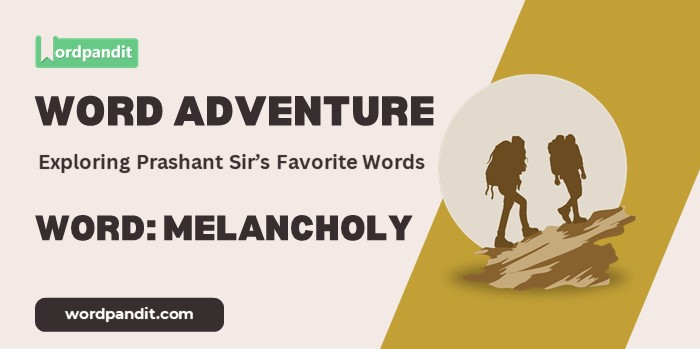Word Adventure: Melancholy
The Headline
"Melancholy: The Tender Ache of a Pensive Heart"
The Scoop
In the rich tapestry of human emotions, few are as nuanced and captivating as melancholy. It's not quite sadness, not quite depression, but a gentle sorrow that can be oddly comforting. Let's embark on a journey to understand this word that has fascinated philosophers, artists, and thinkers for centuries, and continues to color our emotional landscape today.
Let's Break It Down
The Plot Thickens
The history of 'melancholy' is as rich and complex as the emotion itself. Its roots reach back to ancient Greek medical theory, where it was believed that an excess of black bile in the body caused a gloomy disposition. This theory, part of the four humors concept, persisted well into the Middle Ages.
During the Renaissance, melancholy took on a new significance. It became associated with creative genius and deep thinking. The idea of the "melancholic artist" emerged, with figures like Albrecht Dürer creating iconic works depicting this state of mind.
In modern times, our understanding of melancholy has evolved. While it's no longer seen as a result of bodily fluids, it's recognized as a complex emotional state that can be both painful and oddly pleasurable. It's often associated with nostalgia, introspection, and a bittersweet appreciation of life's transient nature.
Word in the Wild
The Twist
Here's an intriguing aspect of 'melancholy': while it's often perceived as a negative emotion, many cultures and philosophies view it as a valuable and even desirable state. In some Eastern philosophies, a melancholic outlook is seen as a path to deeper understanding and appreciation of life. Similarly, in the Western romantic tradition, melancholy was often embraced as a source of creativity and insight. This duality challenges us to reconsider our relationship with so-called "negative" emotions and recognize the potential beauty and growth in our moments of quiet sorrow.
Make It Stick
Melancholy: When your heart wears a bittersweet smile and your soul dances to a minor key!
Your Turn
Reflect on a time when you experienced melancholy. What triggered it? How did it feel, and did you find any unexpected beauty or insight in the experience? Share your melancholy moments in the comments below. Let's explore how this complex emotion manifests in our lives and perhaps gain a new appreciation for its role in our emotional spectrum!
Down the Rabbit Hole
- Curious about the historical view of melancholy? Explore Robert Burton's "The Anatomy of Melancholy" from 1621.
- Interested in melancholy in art? Look into the works of Edward Hopper or the music of Chopin.
- Want to understand more about the psychology of melancholy? Research the concept of "depressive realism" or the role of melancholy in creativity.
The Last Word
As we emerge from our melancholic musings, I hope you've gained a new appreciation for this nuanced and powerful word. 'Melancholy' reminds us that our emotional palette is rich and varied, with each shade offering its own unique beauty and insight. The next time you find yourself in a pensive, slightly sorrowful mood, remember – you're not just feeling sad, you're experiencing the age-old, profoundly human state of melancholy. Until our next word adventure, this is Prashant from Wordpandit, encouraging you to embrace all the colors of your emotional spectrum, including the beautiful blues of melancholy!












